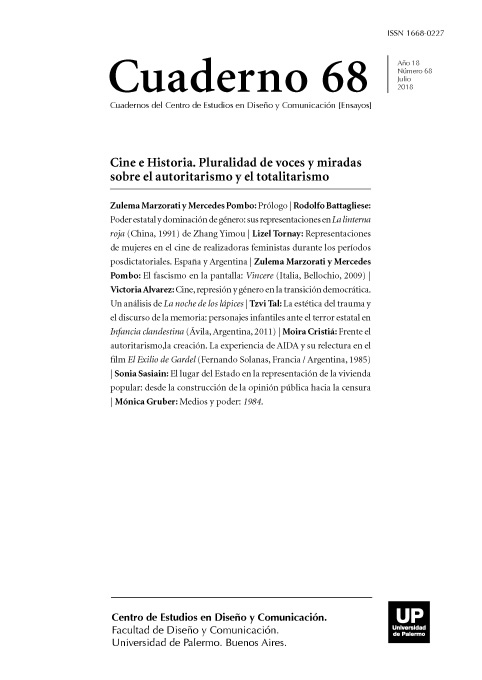El fascismo en la pantalla: Vincere (Italia, Bellochio, 2009)
Abstract
Vincere is an oblique look at fascist Italy, a film made from the figure of Ida Dalser, lover of Benito Mussolini and mother of his firstborn Benito Albino, born in 1915. Both Ida and her son are not usually found in books that recreate the events that make historical fascism.
Bellocchio visibilises them by showing their tragic lives, locked up until their death in psychiatric hospitals to avoid the knowledge of an extramarital relationship that would limit the Duce in his race towards the power. The film is a biographical parable through which the marks and traces that link Dalser’s individual trajectory with the origins, consolidation and fall of fascism are explored. And like all historical cinema, it reconstructs facts from the past to address the resignified Italy´s present.
References
Bobbio, Norberto (2006). Ensayos sobre el fascismo. Buenos Aires: Universidad Nacional de Quilmes
Carsten, Francis (1971. La ascensión del fascismo. Barcelona: Seix Barral
De Felice, Renzo (1979). Entrevista sobre el fascismo con Michael A. Ledeen. Buenos Aires: Sudamericana
Delorme, Sthéfane y Tessé, Jean-Philippe “Un melodrama futurista”. Entrevista con Marco Bellocchio. Cahiers du Cinema, España, N° 35, junio 2010
De Micheli, Mario (1967). Las vanguardias artísticas del siglo XX. Madrid: Alianza
Tannenbaum, Edward R. (1975). La experiencia fascista. Sociedad y cultura en Italia (1922- 1945). Madrid: Alianza Quintana,Ángel. Cahiers du Cinema, N° 35, España, Junio 2010
Rodríguez, Marcos. “Violencia atonal”. El Amante N° 220, Septiembre 2010
Sánchez López Rosario “Mussolini, los jóvenes y las mujeres: La lisonja como estratagema”. Historia Social n° 22, 1995, pp. 19-41
Sorlin, Pierre (1980). The film in History. Restaging the Past. Basil Blakwell. Oxford: Basil Blakwell
Los autores/as que publiquen en esta revista ceden los derechos de autor y de publicación a "Cuadernos del Centro de Estudios de Diseño y Comunicación", Aceptando el registro de su trabajo bajo una licencia de atribución de Creative Commons, que permite a terceros utilizar lo publicado siempre que de el crédito pertinente a los autores y a esta revista.


